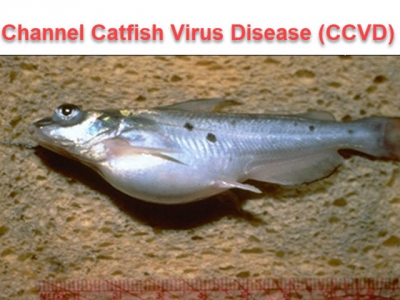Fish disease guide - Channel Catfish Virus Disease (CCVD)

What is it?
CCVD is caused by a herpesvirus. It is known to affect Blue and Channel catfish.
The disease mainly occurs in fish that are less than one year old (fry and fingerlings) or smaller than 15 cm in length.
Where and when might it occur?
CCVD is thought to mainly spread vertically, from brood stock to young fish via the egg.
Horizontal transmission of the disease also occurs directly from the virus shed in water, and from the virus carried by animal vectors.
The disease is also strongly influenced by environmental stressors.
Mortality rates are highest where water temperature exceeds 27C and declines with a reduction in temperature.
Diagnosis
Fish suffering from CCVD often show a decreased interest in food. This is often the first sign and it can be followed by high mortality in fry and juveniles.
Erratic swimming, brief episodes of hyperactivity followed by extended periods of lethargy and large congregations of fish at the sides of the pond are also symptoms that can be seen.
Fish may also stay motionless with the head pointing up and their tail down.
Gross pathological signs are:
• swollen abdomen
• exophthalmos (popeye)
• haemorrhaging of fins and ventral abdomen
• haemorrhaging of the musculature, liver and kidneys
• dark and enlarged spleen
• fluid in the abdominal cavity
• pale, enlarged kidneys, which may be the only internal indication of disease in infected fish.
Mortality rates in exposed fish can increase to greater than 95 per cent.
Survivors of CCVD may experience short-term reductions in feed conversion (reduced weight gain). Generally, these fish appear normal but become carriers of the virus.
Control/ Treatment
There are no effective preventive or treatment measures.
Related news
 Fish disease guide - Spring Viraemia of Carp
Fish disease guide - Spring Viraemia of Carp Spring viraemia of carp (SVC) is an infectious viral disease of carp (Cyprinus carpio) and other cyprinid fish species.
 Fish disease guide - Epizootic Ulcerative Syndrome (Red Spot Disease)
Fish disease guide - Epizootic Ulcerative Syndrome (Red Spot Disease) Red Spot Disease is a seasonal epizootic condition of great importance in wild and farmed freshwater and estuarine fish.
 Fish disease guide - Bacterial Kidney Disease (BKD)
Fish disease guide - Bacterial Kidney Disease (BKD) Bacterial kidney disease (BKD) is a chronic bacterial disease first reported in wild Atlantic salmon populations in the rivers Spey and Dee in Scotland in 1933